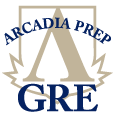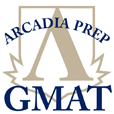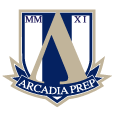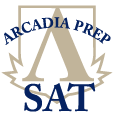Links
About Arcadia
LSAT Shorthand NotationArcadia Prep's GMAT CourseArcadia Prep's LSAT CourseArcadia Prep's SAT CourseArcadia Prep's GRE CourseThe Simply Brilliant GMAT AppAbout the MCATMCAT Physical and Biological SciencesAbout Arcadia Prep's MCAT CourseTerms of SaleTerms of UseAbout Arcadia Apps




LSAT Prep

There are exactly three recycling centers in Rivertown:Center 1, Center ... ...
If each recycling center in Rivertown recycles exactly
three kinds of material, then which one of the following
could be true?
(A) Only Center 2 recycles glass.
(B) ...
(C) ...
(D) ...
(E) ...
*This question is included in LG Sample 3: Difficult Games
(A) Only Center 2 recycles glass.
(B) ...
(C) ...
(D) ...
(E) ...
*This question is included in LG Sample 3: Difficult Games
Replies to This Thread: 0 | ----
Why is that the answer?
Replies to This Thread: 0 | ----
Replies to This Thread: 0 | ----
How is this possible if there is no Tin in cntr 3? I can't get it
Replies to This Thread: 0 | ----
Center 1 = Center 2 = Glass, Wood and Newsprint
Center 3 = Plastic, Tin and Newsprint
Another possibility within the given rule set is:
Center 1 = Center 2 = Glass, Tin and Newsprint
Center 3 = Plastic, Wood and Newsprint
However the latter possibility doesn't pair up with one of the answers.
Niels
Center 3 = Plastic, Tin and Newsprint
Another possibility within the given rule set is:
Center 1 = Center 2 = Glass, Tin and Newsprint
Center 3 = Plastic, Wood and Newsprint
However the latter possibility doesn't pair up with one of the answers.
Niels
Replies to This Thread: 1 | ----
There are exactly three recycling centers in Rivertown:Center 1, Center ... ...
Posted: 01/17/2014 22:15
I spoke too soon. Apparently the "some centre must recycle each material" rule does exist as it's being used to disprove choice b here. If glass didn't have to be recycled somewhere then choice b would be valid. So how can I tell from the language that this rule was implicitly stated? The language seems to indicate it's probable all 5 materials will be recycled between the 3 centres, but seems to come shy of stating this must be true. I feel like I'm going to waste time on my real LSAT trying to figure out which rules are stated implicitly and which aren't.
And I'm still not convinced this is the case which makes me more confused. It's possible to prove b wrong without assuming all materials might be recycled by realizing that b would require neither w nor n nor p to be recycled in plants 1 and 2 leaving insufficient materials to meet the 3 material recycle requirement. This does yield a 'all materials produced' solution, but not as a result of believing that to be a rule.
I'm lost.
And I'm still not convinced this is the case which makes me more confused. It's possible to prove b wrong without assuming all materials might be recycled by realizing that b would require neither w nor n nor p to be recycled in plants 1 and 2 leaving insufficient materials to meet the 3 material recycle requirement. This does yield a 'all materials produced' solution, but not as a result of believing that to be a rule.
I'm lost.
Reply 1 of 1
Replies to This Thread: 0 | ----
Posted: 01/18/2014 03:21
Replies to This Thread: 0 | ----
There are exactly 3 recycling SETS in Rivertown: Center 1, Center 2 and Center 3.
Exactly 5 SETS of material are recycled at these recycling SETS: Glass, Newsprint, Plastic, Tin and Wood. Each recycling SET recycles at least two but no more than three of these SETS of material. The following conditions must hold:
Any recycling SET that recycles wood also recycles newsprint.
Every SET of material that Center 2 recycles is also recycled at Center 1.
Only one of the recycling SETS recycles plastic and that recycling SET does not recycle glass.
If each recycling SET in Rivertown recycles exactly three SETS of material, then which of the following could be true?
=======================
There are exactly 3 recycling SETS in Rivertown: Center 1, Center 2 and Center 3.
RECYCLERS [ [ Center 1 ], [ Center 2 ], [ Center 3 ] ]
Exactly 5 SETS of material are recycled at these recycling SETS: Glass, Newsprint, Plastic, Tin and Wood.
MATERIALS [ [ glass ], [ newsprint ], [ plastic ], [ tin ], [ wood ] ]
Each recycling SET recycles at least two but no more than three of these SETS of material.
Each SET of RECYCLERS must contain N SETS of MATERIAL where N is greater or equal than 2 and N smaller or equal than 3, however the additional rule in the question overrules since each must have exactly 3 materials thus N = 3.
Any recycling SET that recycles wood also recycles newsprint.
In plain words "wood doesn't come alone(, whoever will recycle it must add newsprint)". This make MATERIAL [ wood ] = MATERIAL [ wood, newsprint ]
For the record this does NOT mean the reverse, thus newsprint can be used 'no strings attached'.
Every SET of material that Center 2 recycles is also recycled at Center 1.
This means that if you add materials in SET Center 2 you also extend Center 1 thus Center 1 HOLDS Center 2 materials as a SUBSET. For the record this does NOT mean the reverse thus Center 1 can hold material(s) Center 2 doesn't have. Beware of N meaning Center2 dictates whether or not Center1 can still add a material in order not to exceed the maximum of three. However the rule in the question overrules and make Center1 equal to its SUBSET of materials of Center2 by lack of expansion N = 3 for each material set.
Only one of the recycling SETS recycles plastic and that recycling SET does not recycle glass.
MATERIALCOLLECTIONS {
COLLECTION1 [ empty ] ,
COLLECTION2 [ empty ] ,
COLLECTION3 [ empty ]
}
RECYCLERS {
CENTER1 [ COLLECTION1, COLLECTION2 ] ,
CENTER2 [ COLLECTION2 ] ,
CENTER3 [ COLLECTION3 ]
}
MATERIALS {
MATERIAL1 [ glass ] ,
MATERIAL2 [ newsprint ] ,
MATERIAL3 [ plastic ] ,
MATERIAL4 [ tin ] ,
MATERIAL5 [ wood, MATERIAL2 ]
}
As being said earlier, Center1 will be equal to Center2 by lack of expansion this means that MATERIALCOLLECTION COLLECTION1 remains [ empty ] so we only bother ourselves with COLLECTION2 and COLLECTION3.
Let us start filling these collections with materials from the first to the last and change things when we encounters rules that we need to obey.
COLLECTION2 [ M1, M2, M3 ]
COLLECTION3 [ M4, M5 ]
- Do all RECYCLERS recycle exactly 3 materials? YES
- Does the RECYCLER that recycles wood also recycles newsprint? YES
- Is every material recycled in Center2 also recycled in Center1? YES
- Does only 1 RECYCLER recycles plastic (and isn't recycling glass)? OEPS
This rule dictates A:
COLLECTION2 [ M1 ]
COLLECTION3 [ M3 ]
or B:
COLLECTION2 [ M3 ]
COLLECTION3 [ M1 ]
Plastic(M3) can only be in one RECYCLER thus it can not be in COLLECTION2
Let's start with A and call that AA:
COLLECTION2 [ M1, M2, M4 ]
COLLECTION3 [ M3, M5 ]
and proceed with A and call that AB:
COLLECTION2 [ M1, M5 ]
COLLECTION3 [ M3, M2, M4 ]
So it seems we have 2 solutions AA, AB.
(A) Only Center2 recycles glass(M1)
(B) Only Center3 recycles newsprint(M2)
(C) Only Center1 recycles plastic(M3)
(D) Only Center3 recycles tin(M4)
(E) Only Center1 recycles wood(M5)
All answers which have 'only Center1' or 'only Center2' must be false since their equal. That leaves us with answer B or D...
B is always false because where there's wood(M5) there's also newsprint(M2)
So that makes D the answer that COULD BE true because we have one solution AB where it is true :)
This to say set logic it is, hope this helps.
Niels
Exactly 5 SETS of material are recycled at these recycling SETS: Glass, Newsprint, Plastic, Tin and Wood. Each recycling SET recycles at least two but no more than three of these SETS of material. The following conditions must hold:
Any recycling SET that recycles wood also recycles newsprint.
Every SET of material that Center 2 recycles is also recycled at Center 1.
Only one of the recycling SETS recycles plastic and that recycling SET does not recycle glass.
If each recycling SET in Rivertown recycles exactly three SETS of material, then which of the following could be true?
=======================
There are exactly 3 recycling SETS in Rivertown: Center 1, Center 2 and Center 3.
RECYCLERS [ [ Center 1 ], [ Center 2 ], [ Center 3 ] ]
Exactly 5 SETS of material are recycled at these recycling SETS: Glass, Newsprint, Plastic, Tin and Wood.
MATERIALS [ [ glass ], [ newsprint ], [ plastic ], [ tin ], [ wood ] ]
Each recycling SET recycles at least two but no more than three of these SETS of material.
Each SET of RECYCLERS must contain N SETS of MATERIAL where N is greater or equal than 2 and N smaller or equal than 3, however the additional rule in the question overrules since each must have exactly 3 materials thus N = 3.
Any recycling SET that recycles wood also recycles newsprint.
In plain words "wood doesn't come alone(, whoever will recycle it must add newsprint)". This make MATERIAL [ wood ] = MATERIAL [ wood, newsprint ]
For the record this does NOT mean the reverse, thus newsprint can be used 'no strings attached'.
Every SET of material that Center 2 recycles is also recycled at Center 1.
This means that if you add materials in SET Center 2 you also extend Center 1 thus Center 1 HOLDS Center 2 materials as a SUBSET. For the record this does NOT mean the reverse thus Center 1 can hold material(s) Center 2 doesn't have. Beware of N meaning Center2 dictates whether or not Center1 can still add a material in order not to exceed the maximum of three. However the rule in the question overrules and make Center1 equal to its SUBSET of materials of Center2 by lack of expansion N = 3 for each material set.
Only one of the recycling SETS recycles plastic and that recycling SET does not recycle glass.
MATERIALCOLLECTIONS {
COLLECTION1 [ empty ] ,
COLLECTION2 [ empty ] ,
COLLECTION3 [ empty ]
}
RECYCLERS {
CENTER1 [ COLLECTION1, COLLECTION2 ] ,
CENTER2 [ COLLECTION2 ] ,
CENTER3 [ COLLECTION3 ]
}
MATERIALS {
MATERIAL1 [ glass ] ,
MATERIAL2 [ newsprint ] ,
MATERIAL3 [ plastic ] ,
MATERIAL4 [ tin ] ,
MATERIAL5 [ wood, MATERIAL2 ]
}
As being said earlier, Center1 will be equal to Center2 by lack of expansion this means that MATERIALCOLLECTION COLLECTION1 remains [ empty ] so we only bother ourselves with COLLECTION2 and COLLECTION3.
Let us start filling these collections with materials from the first to the last and change things when we encounters rules that we need to obey.
COLLECTION2 [ M1, M2, M3 ]
COLLECTION3 [ M4, M5 ]
- Do all RECYCLERS recycle exactly 3 materials? YES
- Does the RECYCLER that recycles wood also recycles newsprint? YES
- Is every material recycled in Center2 also recycled in Center1? YES
- Does only 1 RECYCLER recycles plastic (and isn't recycling glass)? OEPS
This rule dictates A:
COLLECTION2 [ M1 ]
COLLECTION3 [ M3 ]
or B:
COLLECTION2 [ M3 ]
COLLECTION3 [ M1 ]
Plastic(M3) can only be in one RECYCLER thus it can not be in COLLECTION2
Let's start with A and call that AA:
COLLECTION2 [ M1, M2, M4 ]
COLLECTION3 [ M3, M5 ]
and proceed with A and call that AB:
COLLECTION2 [ M1, M5 ]
COLLECTION3 [ M3, M2, M4 ]
So it seems we have 2 solutions AA, AB.
(A) Only Center2 recycles glass(M1)
(B) Only Center3 recycles newsprint(M2)
(C) Only Center1 recycles plastic(M3)
(D) Only Center3 recycles tin(M4)
(E) Only Center1 recycles wood(M5)
All answers which have 'only Center1' or 'only Center2' must be false since their equal. That leaves us with answer B or D...
B is always false because where there's wood(M5) there's also newsprint(M2)
So that makes D the answer that COULD BE true because we have one solution AB where it is true :)
This to say set logic it is, hope this helps.
Niels
Replies to This Thread: 1 | ----
There are exactly three recycling centers in Rivertown:Center 1, Center ... ...
Posted: 11/04/2014 22:21
That super long answer was NOT fun to read. Because of the possibility that Center 3 MAY hold either newsprint, wood, or tin and newsprint, there is no CLEAR answer. Whatever makes sense with the remaining choices WORKS bit in terms of possibilities it doesn't make sense to me.

Reply 1 of 1
Replies to This Thread: 0 | ----
Posted: 11/05/2014 07:30
Replies to This Thread: 0 | ----
Reply: James, there is a video explanation toward the beginning of the thread. You will find it useful.







